[et_pb_section fb_built=”1″ admin_label=”section” _builder_version=”3.0.47″][et_pb_row admin_label=”row” _builder_version=”3.0.48″ background_size=”initial” background_position=”top_left” background_repeat=”repeat”][et_pb_column type=”4_4″ _builder_version=”3.0.47″][et_pb_text admin_label=”Text” _builder_version=”3.21.4″ background_size=”initial” background_position=”top_left” background_repeat=”repeat” hover_enabled=”0″ header_font=”||||||||” header_2_font=”||||||||” header_2_font_size_last_edited=”on|tablet” header_2_font_size_phone=”28px”]
How Google’s Recent Algorithm Update Impacted Publishers
Google recently confirmed an update to its core search engine algorithm starting on March 12, 2019. While Google no longer names their updates, they have been confirming several “core” updates each year with the standard advice being that the changes broadly affect a number of queries and that there isn’t one specific area addressed inside of these updates (i.e. links, PageRank, etc.).
For digital publishers, every update that Google makes offers the potential reward of increased organic traffic and improved website revenue. On the flip side if Google’s algorithm negatively impacts a publisher’s website, it is possible they see the exact opposite effect.
So how did Google’s algorithm update in March of 2019 impact digital publishers? Below, I’ll share some data from the thousands of digital publishers we monitor at Ezoic and also provide some excellent survey data from publishers we recently polled on this topic as well.
Were publishers negatively impacted by the Google core update?
No. Probably not.
… at least it doesn’t seem that way initially. Publishers as a whole — and that is a broad category — were not significantly impacted by this update. The early data suggests it may have been beneficial to websites that fall in the category of “publisher” (i.e. not a B2B business, small business, non-profit etc.). This includes bloggers, news sites, big brands, informational websites, and pretty much any website that considers content or media their primary product.
Special thanks to our very own, Julia Rossi (Engineer, Ezoic), for mining out the data for us to share.
We are seeing content creators, bloggers, news sites, and publishers of all types benefit from this update more than they were harmed by it.
Overall, publishers as a whole saw a 4% increase in total organic traffic vs. the previous days of the week prior to Google’s update.
In the chart above, you can see the orange line representing organic traffic from sites that we monitor with low volatility, seasonality, and variance after Google’s algorithm update took place. The blue line represents organic traffic from the exact same sites on the same days of the week prior to Google’s algorithm update on March 12th.
However, as with every major change that Google makes to its core algorithm, there are always going to be sites that improve keyword rankings and those that lose keyword rankings, It’s the nature of the entire process.
When we looked at digital publishers that see very low variability, seasonality, and variance week-to-week in their organic traffic, we saw that approximately 54% of those sites saw improvements in their organic traffic after Google’s core algorithm update on March 12th.
This is not an overwhelming majority. But, there is a small caveat to that.
The publishers that benefited from the change saw an average uplift in organic traffic of approximately 19%. Meanwhile, the publishers that were negatively impacted by the algorithm update saw an average decrease in organic traffic of only 9%.
The takeaway from this information is that the slight majority of publishers we monitor saw improvements in traffic. They saw pretty substantial improvements on average. We eliminated many of the outliers that would spike data in either direction, so an average uplift of nearly 20% is pretty considerable.
What’s more, the publishers that observed lower organic traffic after the update seemed to be negatively impacted to a much lesser degree than the publishers that benefited from the update. Overall, many digital publishers that have been badly burned by Google’s algorithm updates in the past can broadly breathe a sigh of relief with this update. As a whole, this segment of the online ecosystem seems to have avoided a major catastrophe.
How do publishers feel about Google’s recent core update?
Prior to having our data science team dig through thousands of sites to pull out the information above, we surveyed approximately 350 digital publishers to get their thoughts on how they believed the update had impacted them.
We see the sentiment of publishers aligning with our data above.
The majority of respondents claim that they have positively benefited from the changes. Then, another 3rd claim that they haven’t noticed any significant differences.
Only 21% of publishers surveyed claimed that they had been negatively impacted by Google’s recent update.
Was Google’s March Update A Reversal Of The August Update?
One of the rumors or theories being shared about across SEO news sites is that the recent Google core algorithm update in March 2019 is a reversal of the core update that Google announced in August 2018. This update was often referred to as the “Medic Update,” as it was initially reported that sites focusing on health and well-being were the most dramatically impacted (this later wasn’t proven to be entirely true).
Google’s confirmed core algorithm update in August of 2018 seemed to have impacted a large number of informational websites that could be broadly filed into a category commonly referred to in SEO as, YMYL (your money, your life). This term comes from Google’s quality raters guidelines which were updated and published just prior to Google’s update in August of 2018.
While Google claims that they do not actively use any manual quality rater data in the actual search algorithm they publish, they do admit to using real people to grade results when they evaluate experiments or changes. This is so that Google can get some subjective information on how people might broadly react to changes that Google would apply to the actual search algorithm.
This category is a pretty big one for digital publishers. Content creators of all shapes and sizes broadly cover topics that fall under the umbrella of “subjects that affect a persons money, health, and family”. This lead to an even closer evaluation of the guidelines which led many SEOs to suggest that E-A-T (Expertise, Authoritativeness, Trustworthiness) was a core part of the Google update in August of 2018. Unfortunately, this led to a lot of rumormongering, non-data-driven advice, and some pretty hokey suggestions.
In light of how this Google algorithm change potentially impacted publishers in August of 2018, we were curious as to how publishers felt they were impacted during that period. What’s more, we were particularly interested in learning if they thought that any negative effects felt during the Google core update in August were reversed in this recent update.
We asked the publishers that felt negatively impacted by the August update if they felt the March 2019 core algorithm update benefitted them or reversed the negative effects of August 2018.
As we can see above, the majority of digital publishers (again, broad category) felt relatively unaffected by the change in August of 2018. Much like the update in March of 2019, publishers that did feel they were affected believed that it was in a positive manner.
In this case, it does appear that the minority of publishers that felt they were hurt by Google’s August core algorithm update in 2018 believe that they are seeing a reversal or improvement during the March 2019 core update. Only 12% of publishers felt that both recent Google algorithm updates negatively impacted their organic traffic.
What do we know about Google’s recent core update in March?
…Not a lot that can be easily confirmed. What’s more, if it is anything like the last few “core updates” Google adapts a lot of different elements so that a wide range of queries are affected.
It is important to keep in mind that the vast majority of search results actually don’t change very much even when Google does announce big changes. It is a very small amount of queries that are affected.
Below are what a few of the more credible folks in the world of SEO have shared (including Google).
We understand it can be useful to some for updates to have names. Our name for this update is “March 2019 Core Update.” We think this helps avoid confusion; it tells you the type of update it was and when it happened.
— Google SearchLiaison (@searchliaison) March 15, 2019
Some of the March 12 “recoveries” are sites that saw continued SERP visibility declines well after August 1, 2018. Their recoveries are dramatic in the short-term, but this is pretty clearly not a full reversal of the Aug 1 update. — Dr. Pete Meyers (@dr_pete) March 18, 2019
This post fundamentally misunderstands how Google uses raters for search quality — we’ve talked about that a lot of times, eg https://t.co/OMyWje5gPM and https://t.co/0PA6w6c1bM . They don’t evaluate & penalize sites.
— John (@JohnMu) March 12, 2019
Sistrix released some early data around the Google March core update https://t.co/rHHN2BBjTE pic.twitter.com/Z0lpWO4Yu3 — Barry Schwartz (@rustybrick) March 15, 2019
What else did we learn about the Google Core Update In March 2019?
We’re always collecting more data on these topics, but here are a few anecdotes and pieces of information about the data we’ve shared above and what we’ve observed in reviewing analytics for several thousand publishers.
- All the publishers we observed above were serving visitors ads
I only bring this up because it’s not uncommon for “SEO consultants” to point to ads as being a reason for a site losing organic traffic. We’ve discussed at length how to tell if ad density is affecting SEO.
- Site’s with lower traffic saw the most dramatic results
Both positively and negatively. The sites with the most dramatic improvements and declines in organic traffic after the algorithm update seem to be those with lower traffic, to begin with. These variances in exponential growth may be attributed more to the scale of their respective changes vs. a function of the update itself though.
- Not one specific type of site or publisher seems to be fairing better or worse than another
In an attempt to group different types of publishers as best as possible, we were unable to isolate a particular type of publisher that was specifically helped or hurt by this update.
What should publishers do about the Google March 19 Core Update?
Probably nothing that you shouldn’t have been trying to do before.
Google’s advice is always the same.
There’s nothing wrong with pages that may now perform less well. Instead, it’s that changes to our systems are benefiting pages that were previously under-rewarded. There’s no “fix” for pages that may perform less well other than to remain focused on building great content. Over time, it may be that your content may rise relative to other pages.
It seems most publishers adhere to this recommendation, or are simply left without many directions. You can see above that most publishers do not elect to specifically combat these Google core algorithm updates with specific changes.
Here’s what we recommend no matter what:
- Use this data to make old content better and rank higher
- Optimize objective user experience metrics that matter
- Learn from other publishers that are looking at SEO in 2019
- Optimize CSS, JS, and images to improve pagespeed
Still trying to sort through it all?
It’s never easy to find answers when your site is negatively impacted by a Google algorithm update. In many cases, there aren’t great answers. That’s why it is so important to focus on improving your site as a whole using data and best practices. Understanding why Google ranks new other content ahead of yours in search results may prove to be fruitless in the long run.
Thoughts, questions? Leave them below and I’ll try to chime in with any info I can.
[/et_pb_text][/et_pb_column][/et_pb_row][/et_pb_section]


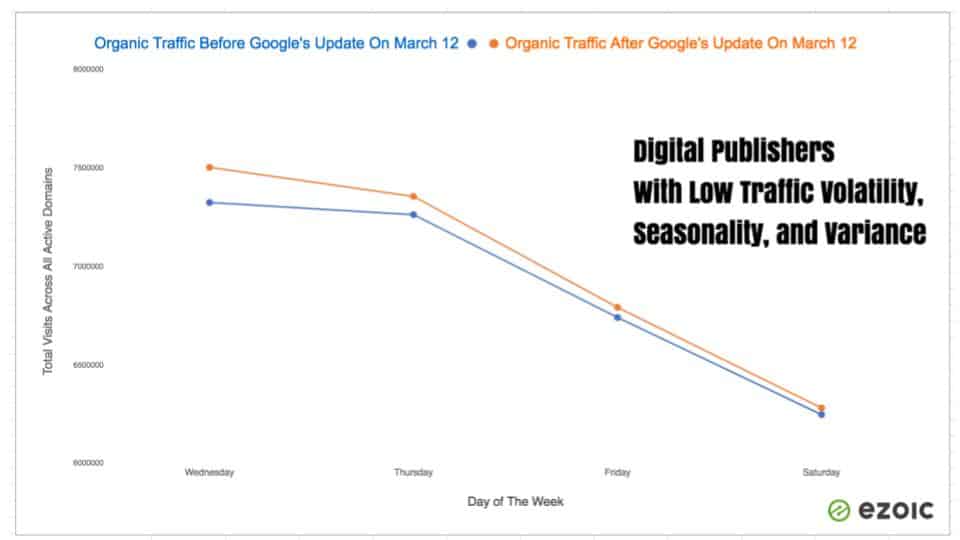
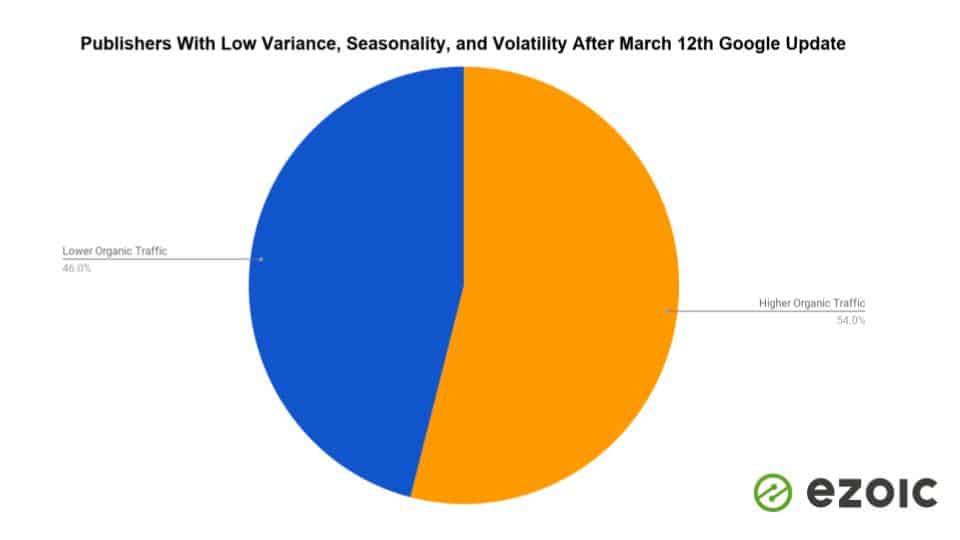
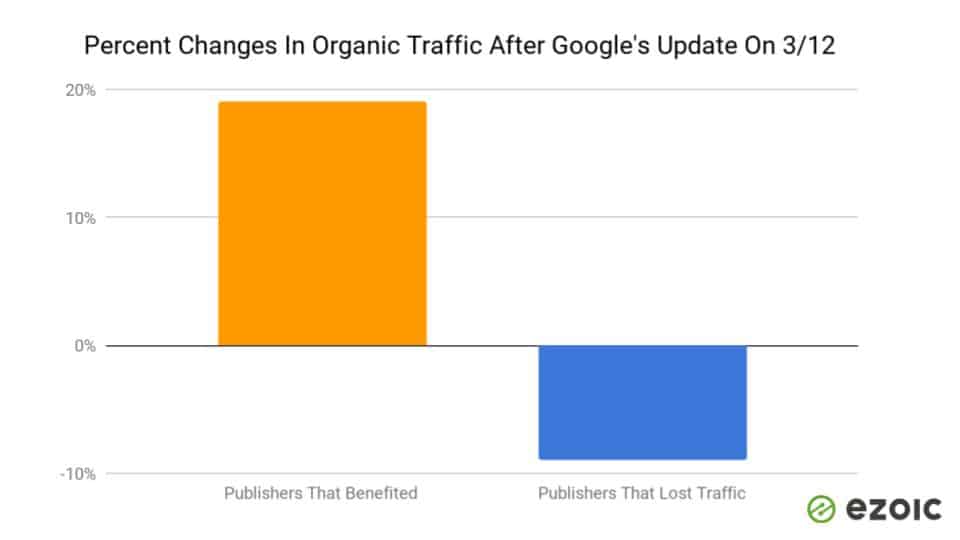
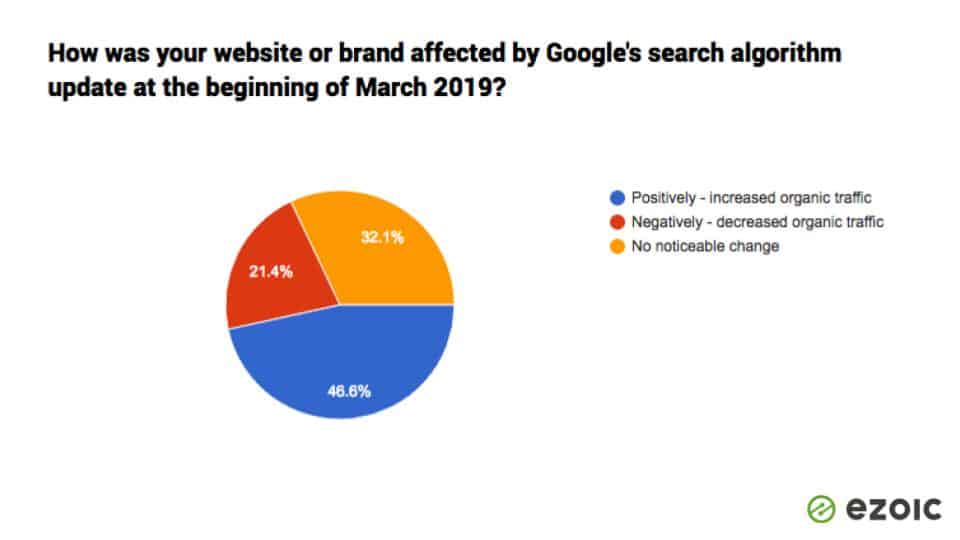
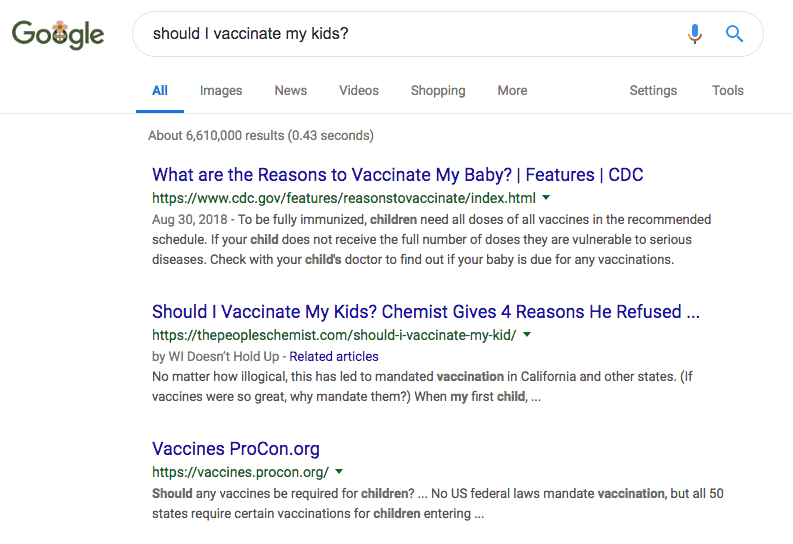
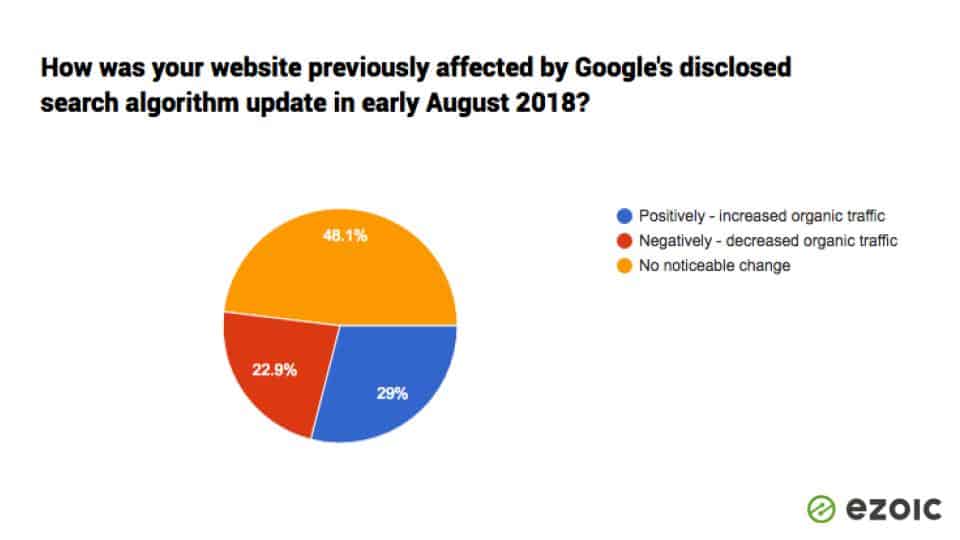
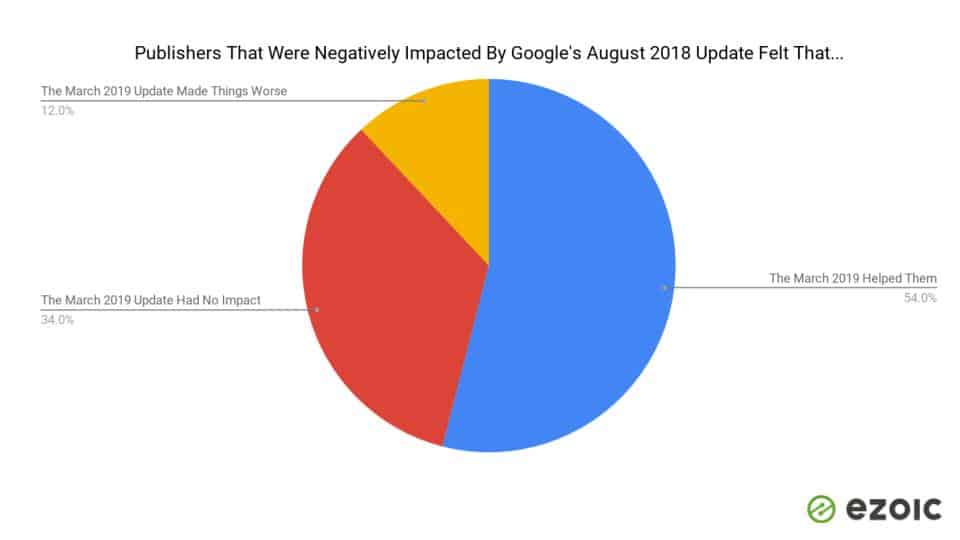
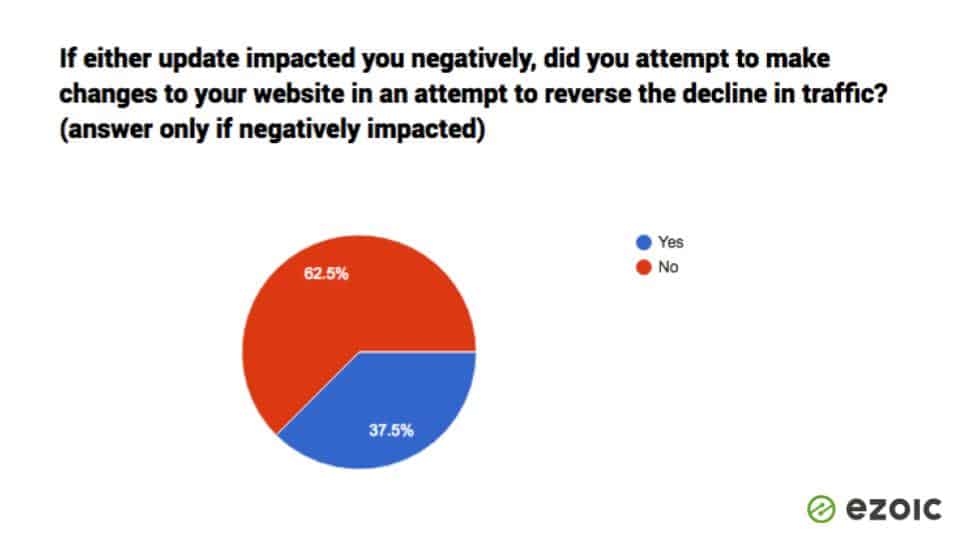
Hello, Tyler Bishop.
Thank you very much for this beautiful explanatory article. It’s a detailed study.
Google’s 2019 algorithm is very aggressive. All the websites I managed decreased 60-70%. I’ve lost too much organic search on my website (completely original content, updated content) that I’ve been working on for 2 years. Even my unique writings that have never been written in the Internet world do not appear in the searches.
On the Bing side, organic searches increased considerably. Unlike Google, I get quality traffic from Bing.
In the 2019 Google algorithm update, ad revenue has fallen. But in some cases, there’s a high return on advertising revenue on my Bing organic traffic.
Hello, Tyler Bishop.
Thank you very much for this beautiful explanatory article. It’s a detailed study.
Google’s 2019 algorithm is very aggressive. All the websites I managed decreased 60-70%. I’ve lost too much organic search on my website (completely original content, updated content) that I’ve been working on for 2 years. Even my unique writings that have never been written in the Internet world do not appear in the searches.
On the Bing side, organic searches increased considerably. Unlike Google, I get quality traffic from Bing.
In the 2019 Google algorithm update, ad revenue has fallen. But in some cases, there’s a high return on advertising revenue on my Bing organic traffic.
I’ve definitely been hit by the March update, traffic is down around 20%. I wasn’t hit in August 2018 at all and traffic has been fairly steady for the past few years, although I was badly hit by the original Panda in 2011. I’m in a health topic and have been with Ezoic for a couple of years.
I’ve definitely been hit by the March update, traffic is down around 20%. I wasn’t hit in August 2018 at all and traffic has been fairly steady for the past few years, although I was badly hit by the original Panda in 2011. I’m in a health topic and have been with Ezoic for a couple of years.
Thanks for sharing, Sophie. This is the downside of these things. There are always outliers in these updates and often sites with great content are left scratching their heads.
Thanks for sharing, Sophie. This is the downside of these things. There are always outliers in these updates and often sites with great content are left scratching their heads.
Hey Tolga, thanks for bringing up a great point about Bing. Google gets a lot of credit because it accounts for 85-90% of all search traffic but Bing and other search engines can bring quality traffic as well. Sometimes it is worth looking at them as well as a means of diversifying traffic sources.
Hey Tolga, thanks for bringing up a great point about Bing. Google gets a lot of credit because it accounts for 85-90% of all search traffic but Bing and other search engines can bring quality traffic as well. Sometimes it is worth looking at them as well as a means of diversifying traffic sources.
Hi Tyler,
Organic search traffic grew at my site through the month of February by around 55% compared to January, and then after the March Google algorithm update, search traffic went down by around 20% at its lowest point compared to February. However, organic traffic seems to be increasing again over the past few days.
Hi Tyler,
Organic search traffic grew at my site through the month of February by around 55% compared to January, and then after the March Google algorithm update, search traffic went down by around 20% at its lowest point compared to February. However, organic traffic seems to be increasing again over the past few days.
In the US market (which tends to have the highest CPMs on display ads) Google often represents about 94% to 95% of search visits for websites that are not penalized.
If a site is heavily penalized by Google to where they lose 90% of their Google search visits they still are likely to receive about half of their search traffic from Google.
In the US market (which tends to have the highest CPMs on display ads) Google often represents about 94% to 95% of search visits for websites that are not penalized.
If a site is heavily penalized by Google to where they lose 90% of their Google search visits they still are likely to receive about half of their search traffic from Google.
Hi, Tyler Bishop!
After the update, traffic really grew!
Hi, Tyler Bishop!
After the update, traffic really grew!
I think that publishers negatively impacted by the google core update.
I think that publishers negatively impacted by the google core update.
The study shows otherwise.
The study shows otherwise.
yeah this time my traffic grew up
it’s party time 😛
cheers
yeah this time my traffic grew up
it’s party time 😛
cheers